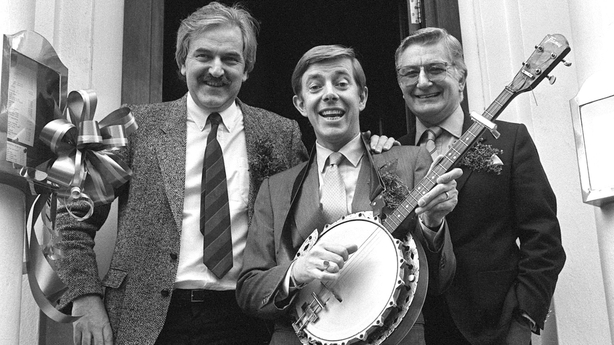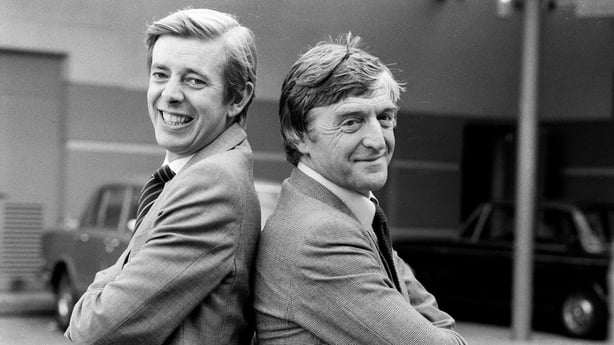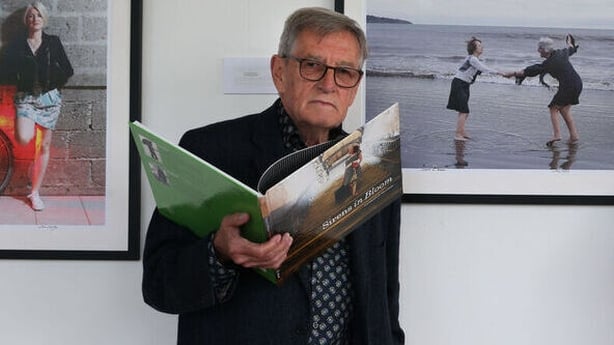The broadcaster and journalist Henry Kelly, who presented TV shows such as Going for Gold and Game for a Laugh, has died aged 78, a statement from his family has said.
Henry Kelly's family said he "died peacefully" on Tuesday "after a period of ill health".
Their statement added: "Henry will be sorely missed by his friends and family, including his partner Karolyn Shindler, their son Alexander, Henry's daughter Siobhan and her mother Marjorie."
Born in Dublin in April 1946, Henry Kelly spent the first seven years of his life in Athlone, Co Westmeath before returning with his family to Dublin.
Kelly began his career at The Irish Times while doing theatre reviews as a student at University College Dublin.

He went on to become the paper's northern editor, based in Belfast in the 1970s.
In 1976, he moved to London and joined the long-running BBC Radio 4 current affairs programme The World Tonight as a reporter and presenter.
TV presenting jobs followed from the 1980s, including the entertainment show Game for a Laugh on ITV from 1981.
He went on to host the BBC One game show Going for Gold for 10 seasons from the late 1980s to the mid-1990s.
The original show saw people from different countries competing against each other for a cash prize through answering questions.
Kelly also appeared on the comedy show Dinnerladies, the morning programme TV-am, and the talk show After Dark.

He was a founding presenter of the UK classical music radio station Classic FM, where he had a daily breakfast programme from 1992 to 2003.
In 1994, he was voted National Broadcaster of the Year at the Sony Radio Awards in the UK.
His later radio career saw him work at the local station BBC Radio Berkshire between 2005 and 2015.
We need your consent to load this rte-player contentWe use rte-player to manage extra content that can set cookies on your device and collect data about your activity. Please review their details and accept them to load the content.Manage Preferences
In 2022, Kelly was asked by a Belfast coroner to give evidence at the inquest of the barman John Moran, who was killed in a loyalist bomb attack in 1972.
A hearing, at Belfast Coroner's Court, heard that Kelly's partner had indicated he had no recollection of the incident and was unable to assist.
Last year, the court said it had been unable to conclude the inquest by a deadline.
Kelly also wrote books including the 1970s non-fiction work How Stormont Fell. He co-authored the 1990s collection Classic FM Musical Anecdotes, Notes and Quotes with John Foley.
A 'superb' journalist
"You were watching a master at work."
That is how award-winning photographer Tom Lawlor describes working with Kelly.
Mr Lawlor was a photographer for the newspaper for 17 years and the two worked together on many occasions.
He described Kelly as a "superb" journalist who had "a great ability of putting people at their ease when he was interviewing them".
However from Mr Lawlor's accounts, it seems that Mr Kelly was not adverse to using his "terrific wit" to deliver the odd barbed jibe either.
Mr Lawlor described how once, when the Reverend Ian Paisley was giving a press conference in Belfast, and threatened to "bring Ulster to its knees", Mr Kelly responded saying "well how will we know?".

On another occasion, Mr Lawlor described seeing that the back of Mr Kelly's car had been "peppered with bullet holes".
He said he only noticed it after Mr Kelly was driving away after dropping him back to the Europa hotel in Belfast one evening.
"I got out of the car and thanked him, and I watched him pull away from the kerb, and as the car drove away into the night I noticed that the back of his car was peppered with bullet holes," Mr Lawlor said.
"I never knew how long they were there, or who put them there, but he never said anything about it, he never mentioned it."
Mr Lawlor's first encounter with Henry Kelly was as a judge in The Irish Times debating finals when the then student won the individual speaker award.
"He just put on a sensational performance the likes of which would never be seen again, it was absolutely wonderful," Mr Lawlor remembered.
When the two worked together on assignment in Wales, Mr Lawlor recalled how each evening Mr Kelly would "entertain" his fellow journalists after he had filed his story.
"Henry would look upon us as a captive audience, and he entertained people night after night, with stories, some song, and his terrific wit."
Mr Lawlor said that it did not come as a big surprise to him that Mr Kelly made the transition from news to entertainment.
He described as a "natural performer" "who had "the capacity to judge an audience and to get them working with him".
The only question Mr Lawlor has of his late friend is: "I don't know why he didn't take over the (entertainment) world, I mean he had the ability to do it, to entertain people."
Copy PA; additional reporting Laura Fletcher

